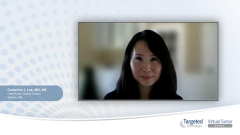
Real-World Experience with Belumosudil
Clinical experiences with belusmosudil are shared among the panel.
Episodes in this series

Transcript:
Yi-Bin Chen, MD: Catherine, the pretty impressive results there, and obviously that's why it was FDA-approved, do you have any hesitation or, better yet, what's your experience with prescribing belumosudil for your patients?
Catherine J. Lee, MD, MS: No, I have no hesitation prescribing belumosudil if I feel my patient is not having whose response stabilized on ruxolitinib. So, when I start belumosudil, I still have patients on ruxolitinib. And beforehand I would taper off the ruxolitinib and I would see some patients have great responses with the addition of belumosudil. I brought this up several times at different events, but I had one patient who had severe BOS [bronchiolitis obliterans syndrome] who's failed 7 lines of therapies respond amazingly to belumosudil, but this was over a year of treatment with belumosudil, so it takes a long time, but my patient came off of oxygen, was able to hike. She has 4 young children, she'd be able to go kick boxing after a year…[inaudible], which she had failed 7 prior lines of therapy. So, I have definitely had great responses with belumosudil. And I believe that now in the agent community looking at combinatorial agents that perhaps belumosudil may be examined with other agents to see if it enhances the response.
Yi-Bin Chen, MD: No, I think it's those anecdotes that push us forward. But you're highlighting a key thing is that especially for chronic graft-versus-host and these newer agents with different mechanisms of action I think we need to have our patients be on therapy for quite a while to be able to understand if it's working or not. Colleen, what's your experience using belumosudil so far?
Colleen Danielson, NP: So, I think the hardest thing is probably the time it takes to see effect, and that's hard for patients. But we've had a couple patients with a similar response with [what] Dr Lee's talking about, these significant improvements. I think one of our patients who had very severe myofascial involvement was debilitating to her quality of life. She was getting Botox injections for her symptoms and was not really having great improvement on ruxolitinib. And she's been on belumosudil, and she's had a great response. She has her quality of life back. She's able to spend time with her grandchildren and bake and cook and knit again. And she was able to come off of the Botox injection. So, tremendous response for her. But, again, it took 5, 6 months for us to start to see [that] effect. So, it does take time and setting those expectations with patients is as important upfront.
Yi-Bin Chen, MD: No, and it's tough because if we tell people you have to wait 6 months, but then the response never comes, it's a difficult dynamic. And that gets at, again, getting back to what we said before, the ability to, how can we predict who's going to respond to what. And that's a huge focus of research going forward.
Transcript is AI-generated and edited for clarity and readability.













































